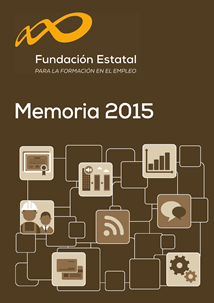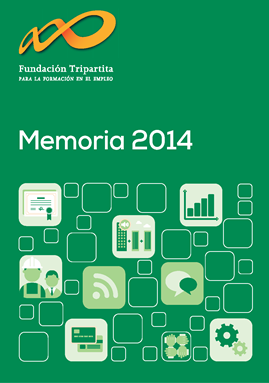Activity Reports
2018 Activity Report

In total, the System of Professional Training for Employment had €2.4 billion over the financial year, of which €1.15 billion were allocated to employed workers, both at the state and regional level.
Number of pages: 28
Publisher: State Foundation for Employment Training
Date of publication: 09/01/2019
See 2018 Activity Report in interactive format.
2017 Activity Report

The figures are clear and allow for a very positive balance sheet in 2017 with regard to fulfilling the foundational objectives, both in the technical management of the FPE initiatives and in the rest of FUNDAE's activities. In this regard, it highlights the initiative of the activities organised by the companies, which had a budget of €633 million for their financing.
As a result, more than 355,000 companies and more than four million workers benefited from training. In addition to this, the participation of the workers through the training offer carried out in 2017, in accordance with the previous year's call, involves 344 approved plans, with a budget of €250 million and with about 650,000 programmed participants.
Number of pages: 78
Publisher: State Foundation for Employment Training
Date of publication: 02/08/2018
2016 Activity Report

Number of pages: 101
Publisher: State Foundation for Employment Training
Date of publication: 18/10/2017
2015 Activity Report

Number of pages: 86
Publisher: State Foundation for Employment Training
Date of publication: 14/07/2016
2014 Activity Report

Number of pages: 90
Publisher: State Foundation for Employment Training
Date of publication: 19/10/2015
- Previous reports
2013
In 2013, the training for employment had 4,276,099 participants in training actions, of which 3,468,682 participated in state-level training initiatives managed by the Tripartite Foundation as a cooperating entity of the State Employment Service. Moreover, 478,621 Spanish companies trained their workers, compared to 459,620 in the previous year, representing a coverage rate of 30% compared to the total number of companies listed for professional training. Download report 2012
In 2012, the first 20 years of national training agreements were celebrated, an milestone that reflects the validity and vitality of the social consensus. More than 3.4 million people participated in all the initiatives managed by the Tripartite Foundation during 2012, which responds to a high degree of efficiency in the use of resources, the budget of which was €776 million. Download report 2011
Spain is at a historic crossroads of reforms, adjustments and constraints, where public sector institutions are obliged to optimise available resources and improve their efficiency. In this context, all the countries in Spain’s environment are reorienting public education and training toward more flexible models through which citizens, companies and workers who are part of a productive structure receive key training that promotes competitiveness. Training for employment in Spain shows a further year positive results. As discussed in detail in the following pages, in this crisis situation, with a shortage of economic resources, more employed and unemployed workers exercise their right to training: with 3,586,493 programmed participants and 432,182 training companies, a coverage rate of 28.85% of the Spanish production fabric has been reached. Download report 2010
In a year when job destruction is the main concern of the institutions, training takes on a renewed role as a key factor in increasing the professional skills of workers, as well as the competitiveness of companies. The Tripartite Foundation initiates a process of continuous improvement and evaluation in the management of training initiatives and works to make training the tool that the production sectors most affected by the crisis should use. The context analysis, the main tasks of management, financing and its results, as well as studies and communication measures are reflected in these 2010 reports from the Tripartite Foundation. Download report 2009
In 2009, the model of professional training for employment was fully consolidated, increasing data on the participation of companies and workers in the initiatives managed by the Tripartite Foundation. The labour market is analysed in the current situation of economic crisis and increasing unemployment from the perspective of training for employment in the sectoral and regional fields. It analyses the main management tasks, the financing and its results. This report is completed by the studies and the communication measures carried out this year. Download report 2008
In 2008, the introduction of the model of professional training model for employment was advanced by the completion of the regulatory development of Royal Decree 395/2007. This report includes the main management tasks, analyses the most relevant work carried out in the field of studies and evaluation, and the communication and institutional relationship measures carried out by the Tripartite Foundation this year. Download report 2007
With the publication of Royal Decree 395/2007, the new model of professional training for employment is launched. It is a year of transition in which the Tripartite Foundation must carry out measures within the new regulatory framework, while also managing the initiatives corresponding to the previous model of continuing training. Download report 2006
In February 2006, the government and the social partners signed the Professional Training Agreement, the start of the reform of the training model for workers. It is a year of transition for the Tripartite Foundation, having to make the technical management of training initiatives, their momentum and extension compatible with the beginning of the organisational restructuring that requires the configuration of the new training management model. Download report 2005
During this year, the activity of the Foundation will be marked by the consolidation of a management structure suited to the requirements of the Royal Decree regulating continuing professional training. The regulation of the various training initiatives has also been modified to improve their functioning and to ensure the participation of the autonomous communities. Download report 2004
In 2004, RD 1046/2003 entered into force and underwent the first in-depth reform of the continuing training system. This report compiles the events that have marked this year in relation to the reform and its regulatory development. It also compiles the changes in management activities required to address the new system. Download report 2003
Third activity report of the Tripartite Foundation for 2003. A relevant year for the system of Continuing Training, since the R.D.1046/2003, of 1 August, is published, reforming this system. It has been a year of transition, in which the management of the latest calls corresponding to the previous model of Training Aid and the planning and implementation of the procedures and tools necessary to develop the new system came together. The bibliographic production of the Foundation has increased by incorporating three new collections into the Foundation's bibliographic fund: Studies, Documents and Reports and Good Practice Guides. The report highlights the increasingly common and extensive use of the corporate website as an internal communication channel and as a means of disseminating the calls and of raising awareness of the continuing training system and its training initiatives. Download report 2002
Second activity report of the Tripartite Foundation for 2002. It is a particularly significant year in the evolution process of the management system of continuing training in Spain, and in which innovations have occurred in the calls: for example, the call of complementary actions, to conform to the projects that the Foundation required. The corporate image of the Tripartite Foundation and its website, a key element for managing the calls, has also been created as it has begun to distribute the management computing applications. Download report 2001
In this year, the first of the III National Agreement on Continuing Training, the Tripartite Foundation for Employment Training is constituted as the organisation responsible for the management of the various continuing training initiatives. The chapters of the report analyse the results of the various training calls published in 2001 (funding, participants, training actions carried out, etc.) and describe the activities carried out by the different departments of the Foundation. Download report 2000
This year, the last during the validity of the II National Agreement on Continuing Training (1997-2000), the Foundation for Continuing Training, FORCEM, publishes its latest Activity Report to inform of the measures carried out and the results obtained in the management of Aid for Continuing Training during 2000. Download report 1999
As each year, the Foundation for Continuing Training, FORCEM, publishes its Activity Report with the intention of informing about its actions and the results achieved in the management of the II National Agreements on Continuing Training during 1999. Download report 1998
The annual report from FORCEM compiles the main activities that the Foundation has carried out throughout 1998, giving an account of the results and achievements in its main areas of management. This year, the regulatory framework for professional training in Spain has been completed, with the approval of the government of the new National Professional Training Programme, which sets out the conditions for articulating Professional Training in its different aspects. Download report 1997
This report extensively analyses the agreements which were signed in December 1996 and are starting in 1997 at a new stage for the National Subsystem of Continuing Training and the Foundation for Continuing Training, FORCEM: the Second National Continuing Education Agreements and the Bases Agreement on the Professional Training Policy. Download report 1993-1996 This report gives an account of the results obtained during the period of validity of the I Continuing Training Agreements (1993-1996). The report presents the principles underlying the new training system and describes some of FORCEM's constituent features as a management tool for the new system. The results obtained over these four years is also analysed, both from an efficiency and effectiveness point of view in achieving the objectives set. Download report 1996
This report reflects the results of the activity carried out by FORCEM during 1996, a period of consolidation for the institution. It includes all the figures on the different forms of support for training and the participation of FORCEM in the European Leonardo and ADAPT programmes and initiatives. The economic distribution of each and every activity carried out is also detailed. Download report